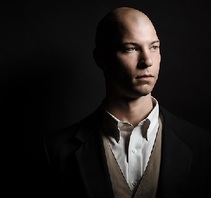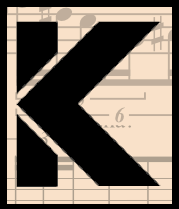 I guess we'll start with the obligatory question of why you decided to go into music professionally, specifically composition. I have always enjoyed creative activity. In addition to a natural affinity for it, there were influential people in my life who fostered my creative growth. Specifically, my father was a musician and my mother introduced me to many different genres, including opera, at a young age. Although my musical education began with playing trombone and piano, I soon started composing and was encouraged to continue doing so by my music teachers. Specifically, Jon Gibbons, one of my early piano instructors, who is also a composer, exposed me to Alban Berg's Lulu Suite, which helped influence me to expand my awareness of the many varieties of musical styles. Later, in college, my main composition instructor Don Malone made a positive impression on me by exposing me to music technology and experimental music. After that exposure, I came to realize that music utilizing electronic technology affords great potential for artistic expression and I want to be part of this phenomenon. I read in your bio that you in the late 90s you started“overdubbing various noises onto cassette tape.” Can you go into that a little more as far as sound sources go, and what made you decide to start experimenting with sound and tape in that way? One of my first experiences overdubbing with a tape cassette was to orchestrate a prank. I learned that it was possible to record over a commercially released cassette by covering the open rectangular holes on the top of the cassette shell. My friend, an avid Beatles fan, had collected everything the band created and claimed to know everything about them. With this in mind, I thought it would be humorous to give him a "very rare, limited release" greatest hits tape with a "largely unknown" hidden track at the end. I used a Casio keyboard and overdubbed layers of muddy low clusters, high tinkling on the keys, finger cymbals, and a short yell (which ended up to be the giveaway). After that hoax, I overdubbed mostly vocal harmonies and the keyboard to represent a bass line or another treble part. Today, I still use the same finger cymbals utilized in that "hidden track"; one can hear them right at the beginning of my latest composition, “of the Wild.” Would you say that was an early stepping-stone to your interest in electronic music? Although my experiences with tape had some influence on my interest in electronic music, my early experiences with electronic keyboards had a more substantial impact. At the time, I was much more concerned with performance and very interested in using the keyboard in a conventional manner. I was intrigued by amplification and included some form of it in my compositions whenever possible, which led to a greater exploration of other technology for pure electronic works. It seems that a lot of your output these days is electronic and electroacoustic music. Do you still write much acoustic music, or do most of your projects involve electronics in some capacity? Let me start by saying that I think the divisions are rather artificial. In my music, I perceive the loudspeaker as a highly advanced acoustic instrument, so it would take a lot of persuasion for me to omit electronics in a composition. In fact, I have declined several commission opportunities for instrumental pieces because the performers are not willing to include electronics. With that being said, I have some music for percussion and electronics that has been performed by percussionist Scott Deal, and I am currently in the early stages of a second composition for Disklavier and electronics. What aspect of electronic music and digital media pulls you into that particular sound world? Is it something you have always been interested in? The more exposure I have to the medium, the more I appreciate electroacoustic music because it enables great expressive capability and diversity of sound material while exhibiting potential for a very powerful and immersive experience. I especially appreciate the variety and spatial element of sounds in a composition. One of the greatest things about the electronic medium is that virtually any sound imaginable can be created or obtained and included in a composition. Just think about all the possibilities resulting from field recordings alone, and the results are endless; there is really no end to the possibilities of timbre diversity that electronic composition can harbor. The other thing I deeply appreciate about this music is that the element of sound in space is brought to another level. In much of music, the sound source is located in the front. The loudspeaker array that modern composers use to surround the audience enables the sound to move around the space and through the audience with much more flexibility than any number of performers can achieve. When starting a new piece of electronic music, specifically an acousmatic piece, do you typically start with source material, a concept or is it some combination of the two? When starting a new piece, I typically start with a combination of the two. In the past, I worked with a “found template.” For example, I may use a personal field recording, such as a tree being cut down, to determine the length and flow of a particular section (or entirety) of a composition. In this case, I would start with the field recording of the tree being cut down. The accented moments (onsets/transients) and areas of greater activity are perceived to have greater "weight" in the found template and can be thought of as causing other sounds (subsequently added to the session) to gravitate toward these moments, and then I begin layering the sounds. From there, I thread the events together based around these central areas. Eventually, most of the original template is removed, but some of the flow of the original experience remains. I still sometimes use this technique, as evidenced in my composition“Age.” Besides that, the spatial element is characteristic of the genre. I consider motion and positioning with increasing frequency when beginning a composition. In a stereo composition, the element of density can convey a totally different impression than in a surround situation. For example, something that has extremely dense layers of activity, where the sounds are perceived as competing against each other and overcrowding, may not have the same effect in a multi-channel situation, where the same material given more space may be extremely open, dynamic, complex, and engrossing. Finally, I remix and recompose material frequently, especially if I am not totally satisfied with the initial result. Do you have any exciting projects coming up in the near future? At the SEAMUS 2015 Conference from March 26-28, I am presenting a commission called “of the Wild” for Virginia Tech's 124.4 loudspeaker system called the Cube. Also in March-April, I am fortunate enough to serve as a Fellow at the Virginia Center for the Creative Arts. I plan to use this residency to work on a new composition for Disklavier and Electronics. A few upcoming CDs including the following: “Age”was jury selected for inclusion on the Luigi Russolo 2014 Sound Art Competition CD from MonoChrome Vision (Russia). “The Pillar”for amplified prepared Disklavier and electronics will be included on an upcoming Experimental Music Studios CD from University of Illinois, Urbana Champaign called "Transient Images." “GATES”was selected for inclusion on the SEAMUS Vol. 24 CD. “GATES”was also jury selected for inclusion on the CONTEMPORANEA 2013 CD by Taukay Edizioni Musicali (Italy). Closing with another obligatory question, what are top 5 favorite pieces of music (any time period, any genre)? Xenakis: Le Légend d'Eer Parmegiani: Sonare Dhomont: AvatArsSon Stockhausen: Microphonie Varèse: Poèm électronique To check out some of John's music you can visit his website or Soundcloud page Here is a video of "The Pillar" for amplified prepared Disklavier
0 Comments
Leave a Reply. |
Early Reflections contains interviews with emerging and currently active composers. Check out the archives to see a list of previous interviewees!
Full Directory of Interviews |

